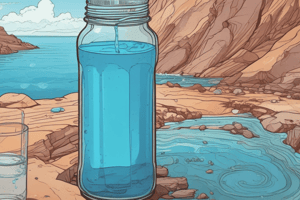Podcast
Questions and Answers
Which of the following factors can affect individual fluid requirements?
Which of the following factors can affect individual fluid requirements?
- Age, gender, and physical activity level
- Climate and body weight
- Diet and sleep patterns
- All of the above (correct)
What is the primary consequence of dehydration mentioned in the passage?
What is the primary consequence of dehydration mentioned in the passage?
- Fatigue and headache
- Kidney stones and constipation
- Impaired immune system response and poor wound healing
- Reduced exercise capacity and increased cardiovascular issues (correct)
How does the thirst mechanism help prevent dehydration?
How does the thirst mechanism help prevent dehydration?
- It regulates hormone levels to control fluid balance
- It triggers fluid intake when plasma osmolality or blood volume changes (correct)
- It increases blood pressure to promote fluid retention
- It signals the kidneys to retain essential fluids
What is the primary reason why people who experience chronic dehydration may lose their ability to sense thirst?
What is the primary reason why people who experience chronic dehydration may lose their ability to sense thirst?
What is the role of organs like the kidneys in water balance regulation?
What is the role of organs like the kidneys in water balance regulation?
Flashcards are hidden until you start studying
Study Notes
Understanding the Body's Water Regulation
Our bodies are largely composed of water, making it crucial for sustaining life. Water plays various roles in maintaining bodily functions such as regulating body temperature, lubricating joints, delivering oxygen, and much more. It also contains essential minerals like sodium, potassium, chloride, calcium, magnesium, and phosphorus. The average adult human body comprises approximately 45–65% water, with most residing within cells and smaller proportions outside them.
The distribution of water throughout the body varies by organ and tissue. For instance, our brain and kidneys contain the highest percentages of water, around 80–85%, while our heart and lungs hold about 75-80%. Other organs and tissues like the liver, skin, muscles, blood, bones, and teeth have lower water concentrations, ranging from 70-10%. This composition ensures that cellular processes proceed smoothly and supports overall health.
Water Balance and Hydration
Maintaining a balance of hydration is vital for optimal bodily function. In general, we should consume enough water daily so that less than 5% of our total body weight is lost through sweating, urine output, or respiration. The rule of thumb is to drink eight glasses of filtered water per day, which equates to approximately half our body weight in ounces. However, factors such as age, gender, physical activity level, and climate can affect individual requirements.
Dehydration and Its Consequences
Dehydration occurs when our bodies lose more fluids than we take in. It can lead to altered physiological functioning, such as reduced exercise capacity and increased risks of cardiovascular issues like high blood pressure. Symptoms can include dark yellow urine color, fatigue, headache, dizziness upon standing, decreased mental alertness, and constipation. Chronic dehydration may even contribute to long-term health problems like kidney stones, poor wound healing, and impaired immune system response.
Role of Thirst Mechanism
Thirst is an important signal that promotes fluid intake. On average, thirst sensation is triggered when plasma osmolality increases by 1-6% or when blood volume drops by 1-3%. As part of the body's regulation mechanism, thirst helps maintain proper fluid balance and prevent dehydration. However, people who experience chronic dehydration due to poor fluid intake gradually lose their ability to sense thirst, hindering their natural defense against dehydration.
Body Water Regulation Systems
Our bodies employ several systems to manage water balance effectively. These include hormones like vasopressin, renin/angiotensin, prostaglandins, and kinins, which work together to control blood pressure, fluid reabsorption, and electrolyte levels. Additionally, some organs like the kidneys play a crucial role in maintaining water balance by excreting excess or retaining essential fluids according to our needs.
Conclusion
In conclusion, understanding the body's water regulation mechanisms and maintaining optimal hydration is paramount for overall health and wellbeing. Regular assessments of personal hydration habits and adjustments based on individual needs can help minimize the risk of complications associated with excessive or insufficient fluid consumption.
Studying That Suits You
Use AI to generate personalized quizzes and flashcards to suit your learning preferences.




